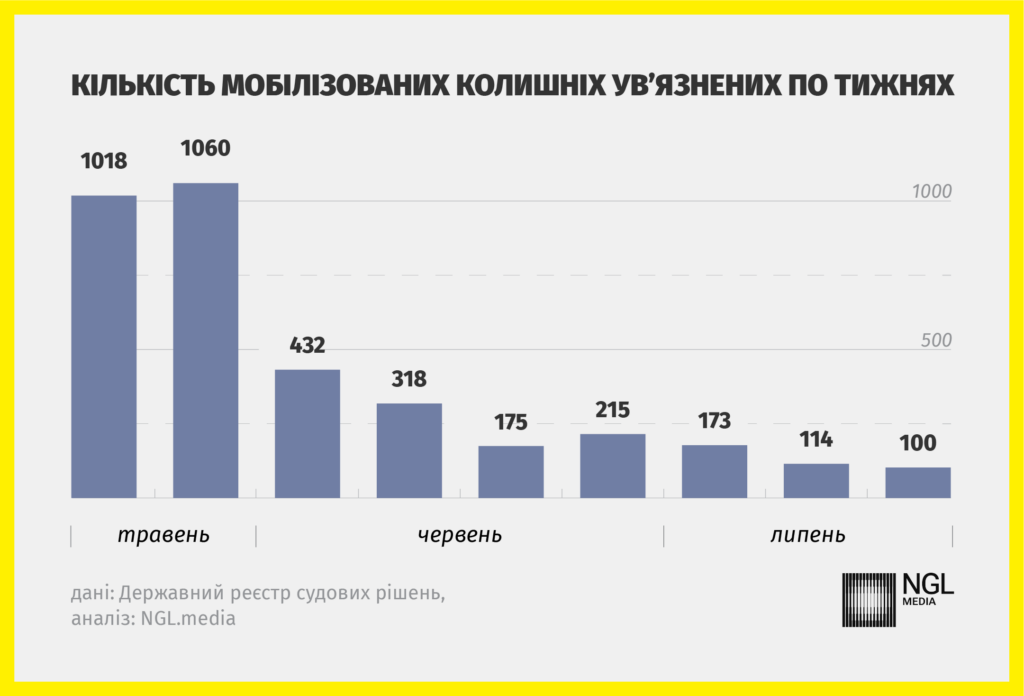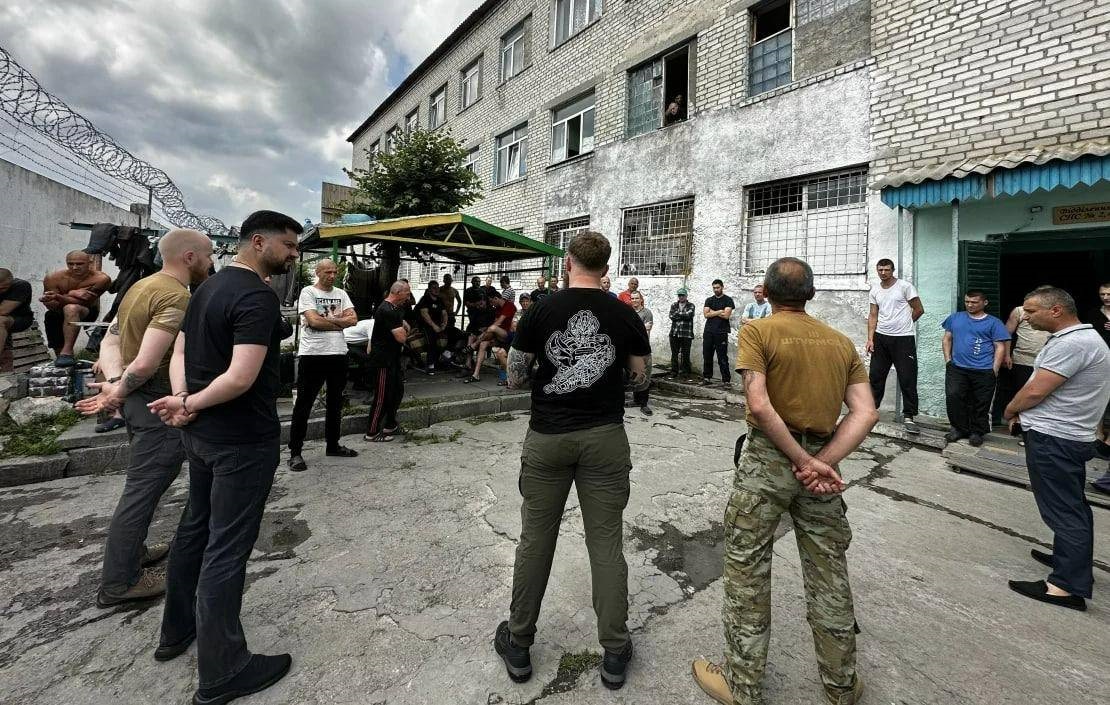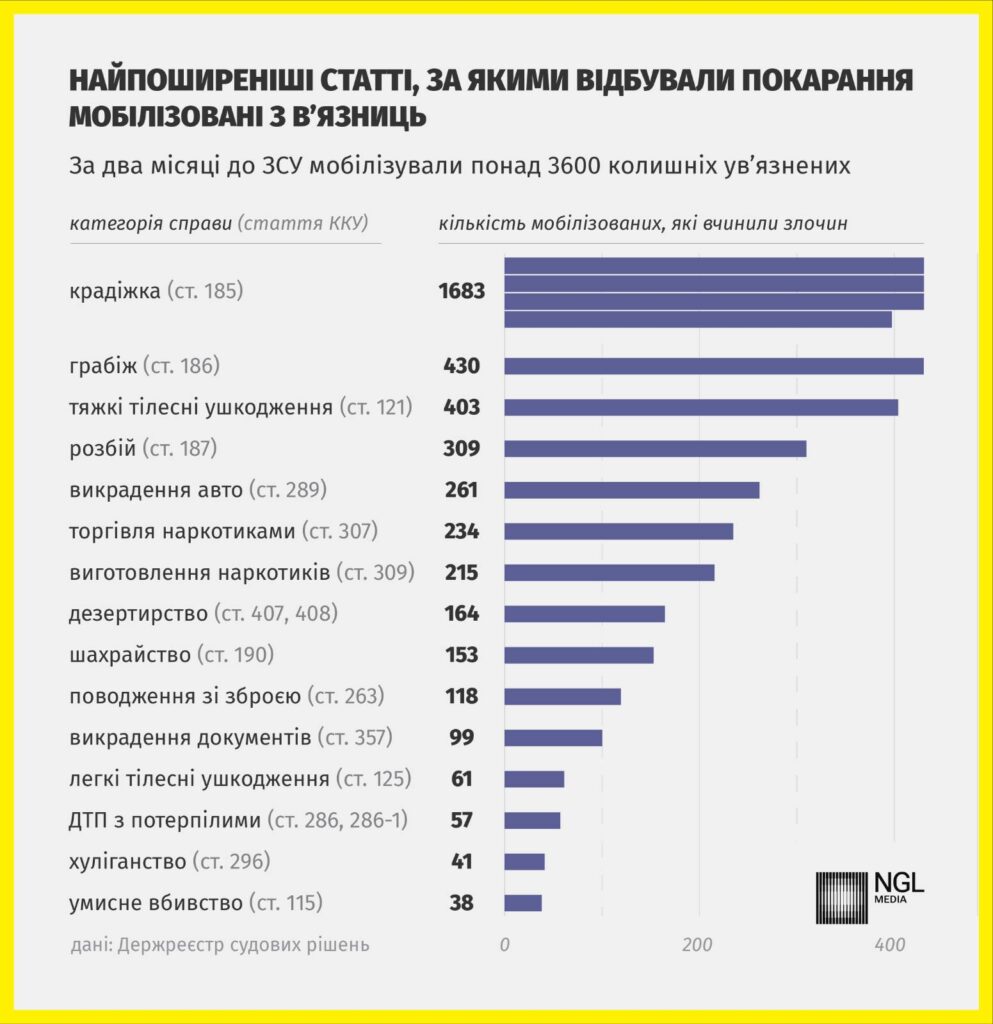Viacheslav Syniavsky, 49, from Kharkiv, spent almost half of his life in prison – about 23 years. He was repeatedly convicted of theft, hooliganism, robbery, banditry, drug possession and even escaping from custody. In July 2022, he was sentenced to four years in prison for robbery again.
Viacheslav Syniavsky became one of nearly four thousand convicts who exercised their right to early release in exchange for voluntary mobilisation to the Armed Forces of Ukraine.
NGL.media analysed several thousand court rulings to find out who these people are.
Release in exchange for military service became possible in May, after the new law took effect. Most of the prisoners (but not all) were given the opportunity to serve their country carrying arms. In addition to their personal desire to fight, they still need to obtain permission from the court and prison administration, as well as the consent of the commander of a particular military unit.
NGL.media’s analysis of the court register shows that 3,611 convicts used this opportunity in two months. This is more than 13% of the total number of prisoners in Ukrainian colonies according to the Ministry of Justice, as of 15 May, there were 27,471 convicts in Ukrainian colonies and prisons . In total, the government expects to draft at least 4,000 convicts, according to the previous statement from Denys Maliuska, the Minister of Justice. This is in fact a full-fledged independent brigade of the Armed Forces.
More than half of the discharges occurred in the last two weeks of May, when the law had just come into force. In June and July, the dynamics dropped significantly, but the figure the Minister announced has already been almost reached in just two months.
40% of repeated offenders
If we analyse the nature of the crimes committed by former prisoners, the vast majority of them were convicted of theft, robbery, assault or serious bodily harm, including those that caused the victim’s death. Almost all of them will serve exclusively in rifle positions. According to court rulings, only a few of those released will serve as combat medics, cooks or drivers.
NGL.media’s analysis shows that 40% of this population are repeated offenders. This is quite a significant rate, as the share of prisoners with previous convictions has been 25-26% over the past few years.
One typical example is Dmytro Strashnikov, 35, from Kharkiv region, who was sentenced to five and a half years in prison for theft. He had previously been convicted of similar crimes. In total, he spent almost 16 years in prison, and was first convicted at the age of 15.
Andrii Sierov, 50, from Dnipropetrovsk region, who had spent about 26 years in penal colonies and prisons, also decided to serve. He was previously convicted of premeditated murder, firearms possession, robbery and theft. His most recent conviction was for fraud and car theft.
How the law works
Of course, not every prisoner has the right to be released to serve in the army. Firstly, one must be fit for military service, which must be confirmed by the military physical evaluation board. Secondly, the release of people convicted of a number of serious crimes is prohibited. People who were in sensitive positions, such as MPs or government officials, are not eligible for parole too.
If the court allows mobilisation, the prisoner is released on parole only from the his main punishment, which is imprisonment. However, other restrictions, for example, deprivation of the right to drive transport or hold certain types of positions still apply.
These people are also subject to certain limitations. For instance, they are not entitled to annual leave. Still, they may receive up to 10 days of family leave or for the period of treatment following the approval by the military physical evaluation board. The court also establishes additional administrative supervision over them, and it is to be carried out by the military unit commander. Contracts with former prisoners are concluded until the end of martial law period, and it’s the main condition for early release.
It is worth noting that for circumventing the contract they face a sentence of 5 to 10 years in prison, while the general liability for evading mobilisation is 3-5 years in prison.
Where will they serve? At the moment, there is no clearly defined algorithm. Previously, Dmytro Lazutkin, the spokesman for the Ministry of Defence, claimed, that former prisoners would serve in separate special units. Still, for example, the Third Assault Brigade of the Armed Forces of Ukraine decided to integrate these people into existing platoons.
What is the procedure for mobilising prisoners?
Olena Vysotska, Deputy Minister of Justice, told NGL.media that the main prerequisite for this process is the convict’s personal desire. “Only after they have expressed their desire, all other processes begin: preparation of paperwork, interviews with commanders and physical evaluation board,” she said.
According to Vysotska, when the prison recruits a certain number of people who want to be mobilised, representatives of different brigades are invited to the facility to talk about the ins and outs of the service. The convicts have the opportunity to choose their place of service. If the brigade commander still refuses to take a certain convict, he will remain in the prison until someone else agrees to take him.
A convict’s petition for mobilisation is submitted to the court only after all the steps have been completed: writing an application, receiving the consent of the colony administration, passing the physical evaluation board, receiving the consent of the commander who had previously read the convict’s personal file.
After receiving the court’s permission, the convict goes to the military unit, where he signs a contract and the process of the military training begins.
“After the court decision [to allow them to be mobilised], they are already free people, the only restriction they have is the contract until the end of martial law period,” says Olena Vysotska.
According to Roman Kostenko, the secretary of the Verkhovna Rada Committee on National Security, about 3,800 convicts have already been mobilised in this way. The court register currently contains as of 22 July 2024 3,611 published release orders.
Some changed their mind at the last minute, and some were denied by the court
Sometimes, though not very often, courts deny convicts their wish to join the Ukrainian Armed Forces. NGL.media has so far identified only 47 such cases, and in 23 cases, the convicts themselves changed their minds about mobilisation. Such convicts continue to serve their sentences.
Instead, in another 24 cases, it was the courts that refused to grant parole. The reasons vary. For example, the convict did not pass the psychological screening, or the military physical evaluation board found him fit only for home front service, or the convict is not eligible for such release at all. For example, the court refused to release Andrii Larchenko from Sumy region, who is serving a sentence for molesting a minor. Prisoners from this category cannot be mobilised.
Among the 24 refusals we analysed, Natalia Litvinenko, the judge of the Dzerzhynskyi District Court in Kryvyi Rih, stands out as a particularly noteworthy one, having refused to release 11 convicts justice Natalia Litvinenko considered the total of 43 applications for mobilisation, of which she granted 32, even though they had all the necessary permits and were not on the list of those denied mobilisation.
For instance, she denied For example, she refused to mobilise Oleksandr Koshelev from Dnipropetrovsk region, who is serving a sentence for killing his father. “The Ukrainian Armed Forces of Ukraine is a well-coordinated team, where soldiers rely on each other, but not a place for correctional education,” the judge explained her position. However, the prosecutor’s office filed an appeal against this decision, and it was upheld. According to the judges of the Dnipro Court of Appeal, the grounds for refusal were insufficient, as there is a public interest in preserving statehood, and therefore the issue of defending the Motherland and its territorial integrity prevails over negative information about the accused.
Natalia Litvinenko also denied mobilization of Vladislav Koval from the local penal colony, as he systematically violates the internal regulations of the colony, refuses to work and overall tries to take a certain position in the criminal hierarchy. The prosecution also filedan appeal against this decision, but no decision has been made yet.
It is noteworthy that if the court denies a convict’s request for mobilisation, he can submit a new application only three months after the day of denial.
Killed and tortured
Prisoners convicted of one murder are also eligible for mobilisation if it is not the murder of a law enforcement officer or a murder with particular cruelty. So, Oleksandr Hriakalo, 44, sentenced to 9 years in prison for the murder of his girlfriend in May 2020, was able to use this opportunity. Then, while drunk, he simply beat her to death.
In court, Hriakalo pleaded not guilty to the murder, although he had previously used force against the girl on several occasions and was sentenced to three years’ probation in 2019.
Mykhailo Kovtun from Vinnytsia region, sentenced to 9 years for the murder of his mother, also exercised his right to mobilisation. The court found that he had repeatedly used violence against his mother and that she died from another beating in October 2021.
In total, 38 convicts under Article 115 of the Criminal Code (premeditated murder) have already used the right to early release in exchange for mobilisation.
The restrictions do not apply to those convicted of torture. For example, Oleksandr Trubach, 32, from Sumy region, being imprisoned for torture, will serve in the UAF. In December 2018, he and several accomplices abused two men, which resulted in death of one. As the court found, Trubach filmed the abuse and supported the actions of his accomplices in every way.
Another person convicted of torture, Pavlo Sydorenko from Poltava, will also join the Armed Forces. In February 2023, he and his friend tied up and severely beat the victim because he refused to drink alcohol with them.
Military personnel return to service
Some former military who ended up in jail also used their right to mobilise. For example, Vasyl Stavila, 22, a former border guard, who deserted with his weapon in June 2021, will serve again. Later in court he blamed his actions on psychological problems due to a breakup with his girlfriend.
The same way was used to mobilise Andrii Prystupa, 28, from Rivne region. While serving in the Armed Forces he drunkenly ran over a child with a motorcycle in a village in Rivne region in August 2022. The court found that Prystupa was addicted from alcohol, and on the eve of the tragic accident he was even treated in a hospital for mental disorders resulting from alcohol consumption. His addiction was confirmed by the commander of the military unit where Prystupa served. As a result, he was sentenced to 8 years in prison.
Interestingly, those convicted of mobilisation evasion are also seeking to serve. In total, we have identified ten such recruits. For example, Oleksandr Romanets from Vinnytsia region sentenced to three years in prison last October, received such a permit.
Seven people convicted of smuggling people across the border also decided to join the army, including Denis Doni from Odesa region, who was sentenced to 5 years for this crime. In June last year, he and his accomplice tried to smuggle three draft dodgers to Moldova, but failed.
Almost served their sentences, but are joining the Armed Forces
Among the cases analysed by NGL.media, there were cases where a convict served almost his entire sentence, but responsibly decided to join the army. For example, Ivan Lysyi from Poltava region, who had to spend just over two months in prison for theft, did not wait for the end of his sentence and joined the Armed Forces. Another convicted robber, Roman Khomenko from Chernihiv region, also decided not to wait for release and mobilised, even though he had only four months left in his sentence.
However, people whose prison sentences are just beginning are also mobilising. For example, Andriy Pastushok, 53, from Kharkiv region, convicted of multiple thefts, expressed his desire to join the army. He has served just over two months of his new five-year sentence. Another example is Yaroslav Zhegistovskyi from Chernivtsi, who served just over five months of his five-year sentence for theft.
NGL.media failed to contact any of the former convicts. Instead, we were only able to talk to the sister of the mobilized Ivan Lysyi, previously convicted of theft. His own sister did not even know that he had been released and was serving in the Armed Forces.
The data analysed by NGL.media shows that there are women among the mobilised convicts, although not many. For instance, Oksana Nester from Rivne, convicted of robbery, received a permit to join the army. Olha Matsiuk from Lviv, serving a sentence for a rather strange theft, was also mobilised . In May 2022, she stole an electronic bracelet from her partner, who was under round-the-clock house arrest, and sold it for UAH 200 on the market. The verdict states that Matsiuk was diagnosed with mental disorders due to alcohol abuse.
What are the risks and how they will be managed
There are certain risks in the process of mobilisation of convicts, in particular, such a mobilised person may escape from a military unit or commit a new crime while already in military service.
NGL.media asked Deputy Minister of Justice Olena Vysotska whether such people could be mobilised again. “The procedure for such mobilisation is universal, it currently has no reservations for such convicts, but we didn’t have any such cases so far,” Vysotska said.
However, she said there still were certain safeguards. In particular, a court, the prison administration or the commander may refuse to mobilise a person again, provided they understand such a person has already violated the rules of parole.
“This law is primarily about the right of a convicted person to join the Armed Forces during the war; we did not consider that convicts would definitely violate the terms of their parole and want to serve again,” explained Olena Vysotska.




